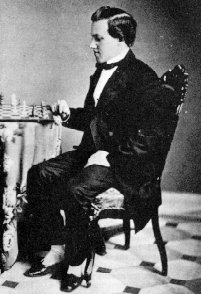User:Fyyer/Sandbox
Europe[edit]

Early on, Morphy wasn't known very well in European chess circles, with few of his games being seen by top players of that time. Because of his age and strength of opposition in his own country, opinion on him in Europe wasn't that which it was in America. Due to his success in the American Chess Congress, many felt confident they had a player strong enough to challenge the best players abroad and that he should be supported by the American Chess Association to make those challenges. Initially, there were problems with travel. European opinion was that they should not have to make the journey to America to play a young relative unknown.[1]
"The American Chess Association, it is reported, are about to challenge any player in Europe to contest a match with the young victor in the late passage at arms, for from $2,000 to $5,000 a side, the place of meeting being New York. If the battle-ground were to be London or Paris, there can be little doubt, we apprehend, that a European champion would be found ; but the best players in Europe are not chess professionals, but have other and more serious avocations, the interests of which forbid such an expenditure of time as is required for a voyage to the United States and back again."
—Illustrated London News, December 26th, 1857
Morphy returned to his home city with no further action. The New Orleans Chess Club determined that a challenge should be made directly to the European champion Howard Staunton.
"Sir,—On behalf of the New Orleans Chess Club, and in compliance with the instructions of that body, we the undersigned committee, have the honor to invite you to visit our city, and there meet Mr. Paul Morphy in a chess match ...
... it was suggested that Mr. Morphy, the winner at the late Congress and the present American champion, should cross the ocean, and boldly encounter the distinguished magnates of the transatlantic chess circles; but it unfortunately happens that serious family reasons forbid Mr. Morphy, for the present, to entertain the thought of visiting Europe. It, therefore, becomes necessary to arrange, if possible, a meeting between the latter and the acknowledged European champion, in regard to whom there can be no scope for choice or hesitation——the common voice of the chess world pronounces your name ..."—New Orleans Chess Club to Howard Staunton, February 4th, 1858
Staunton made an official reply through the Illustrated London News stating that it was not possible for him to make the voyage to America and that Morphy must come to Europe if he wishes to challenge him and other European chess players.
"... The terms of this cartel are distinguished by extreme courtesy, and with one notable exception, by extreme liberality also. The exception in question, however, (we refer to the clause which stipulates that the combat shall take place in New Orleans!) appears to us utterly fatal to the match ...
... If Mr. Morphy—for whose skill we entertain the liveliest admiration—be desirous to win his spurs among the chess chivalry of Europe, he must take advantage of his purposed visit next year; he will then meet in this country, in France, in Germany, and in Russia, many champions whose names must be as household words to him, ready to test and do honor to his prowess."—Illustrated London News, April 3rd, 1858
Eventually, Morphy traveled to Europe to play Staunton and other chess greats. After soundly defeating virtually all of the top players, the only one left to challenge was Staunton. Morphy made numerous attempts at setting up a match with Staunton, but none ever came through. Staunton was later criticised for avoiding a match with Morphy. Staunton is known to have been working on his edition of the complete works of Shakespeare at the time, but he also competed in a chess tournament during Morphy's visit. Staunton later blamed Morphy for the failure to have a match, suggesting among other things that Morphy lacked the funds required for match stakes—a most unlikely charge given Morphy's popularity.

Seeking new opponents, Morphy crossed the English Channel to France. At the Café de la Régence in Paris, the center of chess in France, he played a match against Daniel Harrwitz, the resident chess professional, soundly defeating him.
In Paris, Morphy suffered from a bout of intestinal influenza. In accordance with the medical wisdom of the time, he was treated with leeches, resulting in his losing a significant amount of blood. Although too weak to stand up unaided, Morphy insisted on going ahead with a match against the visiting German master Adolf Anderssen, considered by many to be Europe's leading player. Despite his illness Morphy triumphed easily, winning seven while losing two, with two draws. When asked about his defeat, Anderssen claimed to be out of practice, but also admitted that Morphy was in any event the stronger player and that he was fairly beaten. Anderssen also attested that in his opinion, Morphy was the strongest player ever to play the game, even stronger than the famous French champion La Bourdonnais.
Both in England and France, Morphy gave numerous simultaneous exhibitions, including displays of blindfold chess in which he regularly played and defeated eight opponents at a time. Morphy played a well-known casual game against the Duke of Brunswick and Count Isouard at the Italian Opera House in Paris.
